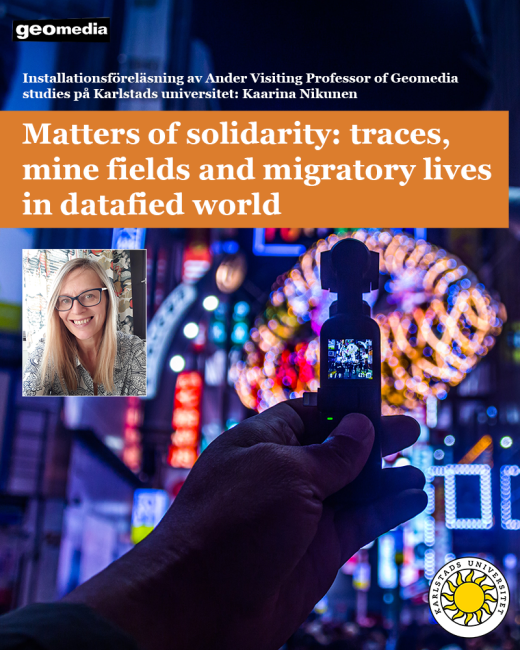Installationsföreläsning av Ander Visiting Professor of Geomedia studies på Karlstads universitet: Kaarina Nikunen
Matters of solidarity: traces, mine fields and migratory lives in datafied world
In this talk I introduce my on-going research on datafication and digital everyday life with the undocumented migrants in Finland. The research points out the complex implications of datafication among people in precarious life situations. It strives to understand the multiple ways in which datafication is entangled in our everyday lives and the way it may pose new inequalities in the context of Nordic welfare states.
This talk also pays attention to the methodological choices made in studying datafication among people who often remain invisible in public but are subjected to and depended on multiple data-driven services and practices. The broader implications of datafication are discussed through the concept of material solidarity. Inspired by feminist scholarship the concept highlights the significance of technological and infrastructural dimensions of media and the ways they matter to solidarity and social justice.
Bio
Kaarina Nikunen’s research explores the ways in which media construct our understanding of the world and possibilities of participation in terms of social justice and solidarity. She’s particularly interested in how emotions and affect drive solidarity, social movements and participation, as well as how emotions are crafted through and with media. This work comes together in her recent book Media Solidarities: Emotions, Power and Justice in the Digital Age (Sage, 2019).
She is currently focusing on questions of data and inequalities that she explores in two projects: First, the project Fair Data, which explores datafication and public participation by interrogating fair data visions and practices in media industries and among citizens. It is part of BIBU (Tackling Biases and Bubbles in Participation) research funded by the Strategic Research Council of the Academy of Finland.
Secondly, Intimacy in Data Driven Culture (IDA) explores how digitization and datafication affect and shape private, social, occupational and collective lives and everyday experiences. She is also co-leading a Nordic research network Datafication, Data Inequalities and Data Justice.
12 november 2021
14.30-16.00
11D121
Samt på zoom


